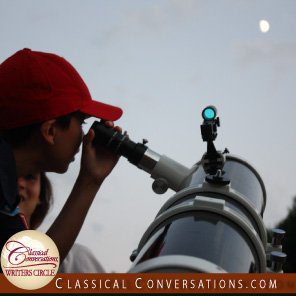Last month, I wrote an article called, “How to Raise a Discoverer.” This month, I want to expand on that idea. Toward the end of the first article, I argued that Dorothy Sayers, Leigh Bortins, and Classical Conversations have equipped parents with the necessary tools that will help them to educate children in accordance with their nature, thereby encouraging them in their natural desire to learn and potentially leading to a new generation of discoverers.
The first tool parents are equipped with in educating their children is the art of grammar. This art is most enjoyed by our children when they are of elementary age. They enjoy the predictably (and, therefore, the order and harmony) that comes from repeated chanting and singing of facts. The art of grammar gives them the opportunity to memorize vast amounts of information related to a subject or a series of subjects without regard for their relationships. They are collecting facts at a time when they are only interested in collecting facts. Children at this age are not as interested in seeing the relationships that develop between these facts as, say, we are. This allows them to focus on the accumulation of facts without being slowed down like we are. As a result, they can memorize far more efficiently than we can. The need to see these relationships will come when their desire to see them comes as well. This tool by itself does not a discoverer make, but it does make someone who will be very good at Jeopardy.
The second tool that parents are equipped with in educating their children is the art of dialectic. This art is most enjoyed by our children when they are young teens of junior high age. They enjoy the argument and debate that comes from discovering and examining the relationships between the facts they previously memorized. With this tool, our children take the facts they have collected, and through the process of comparing, relating, arguing, debating, contemplating, and discussing they distill these facts into truths—timeless truths. These truths, however, are not something we force-feed to them through lectures, but something they discover for themselves through this process—a process that is primarily built on the constant asking of questions by the student and tutor or parent. And the dialectic process itself is something that is done in accordance with their nature at that age. The lecture experience, however, goes against the grain of their natural desire for learning. Using the dialectic tool whets the appetite of discovery, preparing the young learner to be a future discoverer. The lecture, on the other hand, is like telling a child everything has been discovered and there is nothing left for them to do, but sit there and listen to me recite all that has been discovered.
The third tool that parents are equipped with in educating their children is the art of rhetoric. This art is most enjoyed by our children when they are teens of high school age. They enjoy trying to effect specific opinions from others. Unfortunately, the only tool our culture gives them for this purpose is their appearance. Thus, many high school aged children become obsessed with acquiring the right shoes, the right clothes, and the right hairstyle. The art of rhetoric teaches them to use different tools—eloquent speech, persuasive communication, beautiful words, and honorable actions—to effect specific opinions from others, opinions not just about the student, but also about the truths they distilled with the art of dialectic.
The student who learns how to become a discoverer through the arts of grammar and dialectic is a student who learns how to speak well regarding and act rightly with their discoveries. The mastery of this final art and the sense of accomplishment that accompanies it complete the process of raising a discoverer. This young man or woman will not be able to help but continue the journey of discovery with anything that is set before them, anything that piques their curiosity.
On the other hand, the student who is educated apart from these tools and who is never truly equipped with them is the student who goes through his educational journey thinking there is nothing left to discover, only things left to be told. And what if they do not want to hear what the teacher is saying? One leads to a student waiting to be told what to do and the other leads to a student on an adventure to find whatever is there to be discovered.




